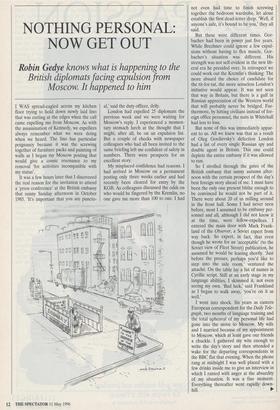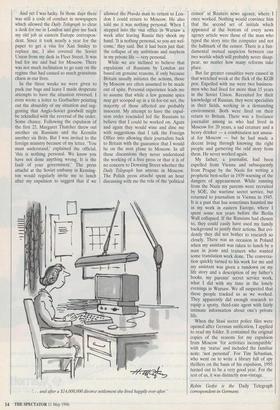NOTHING PERSONAL: NOW GET OUT
Robin Gedye knows what is happening to the British diplomats facing expulsion from Moscow. It happened to him I WAS spread-eagled across my kitchen floor trying to hold down newly laid lino that was curling at the edges when the call came expelling me from Moscow. As with the assassination of Kennedy, we expellees always remember what we were doing when we heard. The lino has particular poignancy because it was the screwing together of furniture packs and painting of walls as I began my Moscow posting that would give a comic resonance to my removal 'for activities incompatible with my status'.
It was a few hours later that I discovered the real reason for the invitation to attend a 'press conference' at the British embassy that sunny Sunday afternoon in October 1985. 'It's important that you are punctu- al,' said the duty officer, drily.
London had expelled 25 diplomats the previous week and we were waiting for Moscow's reply. I experienced a momen- tary stomach lurch at the thought that I might, after all, be on an expulsion list. But a couple of checks with newspaper colleagues who had all been invited to the same briefing left me confident of safety in numbers. There were prospects for an excellent story.
My misplaced confidence had reasons. I had arrived in Moscow on a permanent posting only three weeks earlier and had recently been cleared for entry by the KGB. As colleagues discussed the odds on who would be fingered by the Kremlin, no one gave me more than 100 to one. I had not even had time to finish screwing together the bedroom wardrobe, let alone establish the first dead-letter drop. 'Well, if anyone's safe, it's bound to be you,' they all said.
But these were different times. Gor- bachev had been in power just five years. While Brezhnev could ignore a few expul- sions without having to flex muscle, Gor- bachev's situation was different. His strength was not self-evident in the new lib- eral era he presided over. In retrospect we could work out the Kremlin's thinking: The more absurd the choice of candidate for the tit-for-tat, the more senseless London's initiative would appear. It was not seen that way in Britain, but there is a gulf in Russian appreciation of the Western world that will probably never be bridged. Fur- thermore, by hitting civilians instead of for- eign office personnel, the suits in Whitehall had less to lose.
But none of this was immediately appar- ent to us. All we knew was that as a result of Oleg Gordievsky's defection London had a list of every single Russian spy and double agent in Britain. This one could deplete the entire embassy if it was allowed to run.
So I strolled through the gates of the British embassy that sunny autumn after- noon with the certain prospect of the day's best foreign story ahead of me. I must have been the only one present blithe enough to be convinced he would not be part of it. There were about 20 of us milling around in the front hall. Some I had never seen before, most I assumed to be embassy per- sonnel and all, although I did not know it at the time, were fellow-expellees. I entered the main door with Mark Frank- land of the Observer, a Soviet expert from way back. So expert, in fact, that even though he wrote for an 'acceptable' (to the Soviet view of Fleet Street) publication, he assumed he would be leaving shortly. 'Just before the presser, perhaps you'd like to step into the side room,' ventured the attaché. On the table lay a list of names in Cyrillic script. Still at an early stage in my language abilities, I skimmed it, not even seeing my own. 'Bad luck,' said Frankland as I began to walk away, 'you're on it as well.'
I went into shock. Six years as eastern European correspondent for the Daily Tele- graph, two months of language training and the total upheaval of my personal life had gone into the move to Moscow. My wife and I married because of my appointment to Moscow, which at least gave our friends a chuckle. I gathered my wits enough to write the day's story and then attended a wake for the departing correspondents in the BBC flat that evening. When the phone rang at midnight I was well placed with a few drinks inside me to give an interview in which I ranted with anger at the absurdity of my situation. It was a fine moment. Everything thereafter went rapidly down- hill. And yet I was lucky. In those days there was still a code of conduct in newspapers which allowed the Daily Telegraph to clear a desk for me in London and give me back my old job as eastern Europe correspon- dent. Since it took nearly a year for the paper to get a visa for Xan Smiley to replace me, I also covered the Soviet Union from my desk in Fleet Street. It was bad for me and bad for Moscow. There was not much inclination to go easy on the regime that had caused so much gratuitous chaos in our lives.
In the three weeks we were given to pack our bags and leave I made desperate attempts to have the situation reversed. I even wrote a letter to Gorbachev pointing out the absurdity of my situation and sug- gesting that Anglo-Soviet goodwill might be rekindled with the reversal of the order. Some chance. Following the expulsion of the first 25, Margaret Thatcher threw out another six Russians and the Kremlin another six Brits. But I was invited to the foreign ministry because of my letter. 'You must understand,' explained the official, `this is nothing personal. We know you have not done anything wrong. It is the fault of your government.' The press attaché at the Soviet embassy in Kensing- ton would regularly invite me to lunch after my expulsion to suggest that if we allowed the Pravda man to return to Lon- don I could return to Moscow. He also told me it was nothing personal. When I stepped into the visa office in Warsaw a week after leaving Russia they shook my hand. 'It is nothing personal, so you are wel- come,' they said. But it had been just that: the collapse of my ambitions and mayhem in my private life — very personal.
While we are inclined to believe that expulsions of Russians by London are based on genuine reasons, if only because Britain usually initiates the actions, those by Moscow are often assumed to be made out of spite. Personal experience leads me to assume that while a few genuine spies may get scooped up in a tit-for-tat net, the majority of those affected are probably innocent. My attempt to have the expul- sion order rescinded led the Russians to believe that I could be worked on. Again and again they would wine and dine me with suggestions that I talk the Foreign Office into allowing their journalists back to Britain with the guarantee that I would be on the next plane to Moscow. In all these discussions they never understood the working of a free press or that it is of no concern to Downing Street whether the Daily Telegraph has anyone in Moscow. The Polish press attaché spent an hour discussing with me the role of the 'political . . and after a $14,000,000 divorce settlement she lived happily ever after.' censor' at Reuters news agency, where I once worked. Nothing would convince him that the second set of initials which appeared at the bottom of every news agency article were those of the man who typed the story into the computer and not the hallmark of the censor. There is a fun- damental mutual suspicion between our two worlds which will probably never disap- pear, no matter how many reforms take place.
But far greater casualties were caused in that wretched week at the flick of the KGB pen. Expelled with me were two business- men who had lived for more than 15 years in the Soviet Union. Recruited for their knowledge of Russian, they were specialists in their fields, working in a demanding environment. Both were fired on their return to Britain. There was a freelance journalist among us who had lived in Moscow for 20 years, a sad creature and a heavy drinker — a combination not unusu- al for Moscow — but he had made a decent living through knowing the right people and garnering the odd story from them. He never worked again.
My father, a journalist, had been expelled from Vienna and subsequently from Prague by the Nazis for writing a prophetic best-seller in 1939 warning of the dangers of appeasement. While running from the Nazis my parents were recruited by SOE, the wartime secret service, but returned to journalism in Vienna in 1945. It is a past that has sometimes haunted me in my work in eastern Europe, where I spent some ten years before the Berlin Wall collapsed. If the Russians had chosen to, they could easily have used my family background to justify their actions. But evi- dently they did not bother to research so closely. There was an occasion in Poland when my assistant was taken to lunch by a man in jeans and trainers who wanted some translation work done. The conversa- tion quickly turned to his work for me and my assistant was given a rundown on my life story and a description of my father's books, my parents' secret service work, what I did with my time in the lonely evenings in Warsaw. We all suspected that these people tracked us as we worked. They apparently did enough research to equip a spotty, third-rate agent with fairly intimate information about one's private life.
When the Stasi secret police files were opened after German unification, I applied to read my folder. It contained the original copies of the reasons for my expulsion from Moscow 'for activities incompatible' with my 'status' and included the familiar note: 'not personal'. For Tim Sebastian, who went on to write a library full of spy thrillers on the basis of his expulsion, 1995 turned out to be a very good year. For the rest of us, it was distinctly non-vintage.
Robin Gedye is the Daily Telegraph correspondent in Germany.



































































 Previous page
Previous page